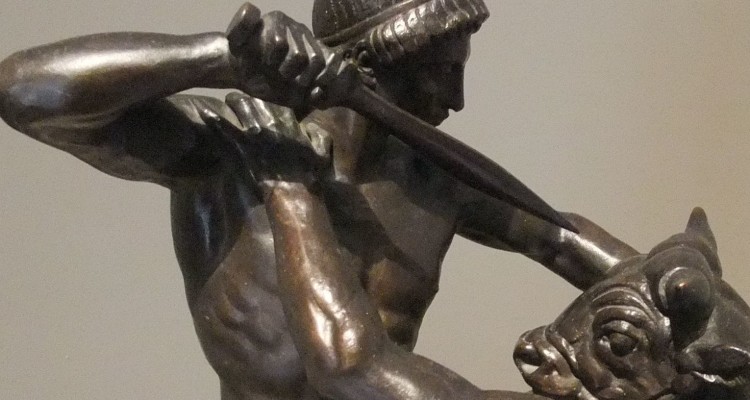Black Sail
“A dream I had,
Mother,
of a man with noble
and furrowed brow,
waiting, waiting.
Vainly, his eyes
sweep the horizon
of a fathomless sea.”
“Come, my son, it is time,
now follow me.”
Amid majestic trees
in forest deep
lichened, granite heavy,
a rock does hold
a secret.
Heroes do
what heroes must.
The rock is raised
a sword revealed.
“Gods be praised
‘tis yours to keep,
Theseus.”
The son departs and
giants twain
are quickly slain.
A bed, too long,
too short for some,
fools not our canny youth,
whose actions swift
suspends cruel
Procrustes
twixt sea and cliff.
For heroes do
what heroes must.
Mothers cry
and fathers blanch.
On the morrow
a ship must launch
with a cargo
of despair.
Youths and maidens
pair by pair
a horrible fate to meet
on the distant isle of Crete
for Athens,
its blood debt must keep.
By baleful acts,
Medea
knows her husband’s son
and does propose
a toast,
slipping the youth
a poisoned cup.
‘Ere he can sup
his father,
Aegeus,
spies the sword
well-known.
The one he hid
beneath a stone.
His son he welcomes
to his home.
Eye moist,
heart full, young
Theseus
knows what he must do.
Withdraws from the king’s
loving grasp,
“There is a boon
that I must ask.”
And on the morrow
the king greaves,
bids farewell
as his son leaves
beneath the sail
of black.
For heroes do
what heroes must.
Wrought of stone
and wisdom both,
Daedalus’s Labyrinth
holds a secret dread,
a monster fed
on blood and sinew
of Athen’s youthful hopes.
Minos,
angered and vengeful king,
has a daughter fair;
a silken strand,
she offers
Theseus –
whom she loves –
to guide him hence,
when he has done
what heroes must.
At the heart of
Minos’s maze,
our hero brave
and his Athenians
find the monstrous calumny,
with head of bull
and taste for blood,
asleep.
Theseus
rips horn from head,
the creature howls
with dread
and charges;
only to drop dead
as his horn
does embed
itself
within his darkened heart.
Using his lover’s
silken thread
Theseus
is led to freedom
and to wed
Ariadne.
But heroes do
what heroes must, as
Dionysus,
god of wine
and lust,
seeks Ariadne for himself.
Forlorn,
his love abandoned
on Naxos Isle,
this Prince
to Athens bound,
his spirits as black
as his forgotten sail.
A man with noble
and furrowed brow
scans the horizon
of the fathomless deep,
for a pristine sail.
His heart leaps
when a silhouette he spies
but its shadow
resolves
into a father’s despair,
and he casts himself
into the air,
and falls.


Leave a Reply